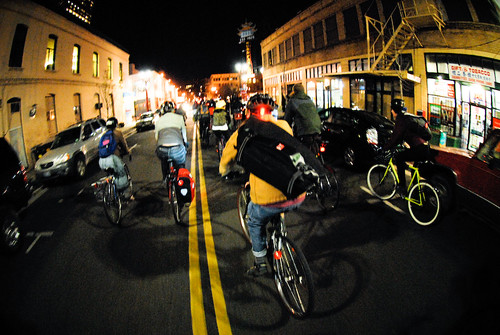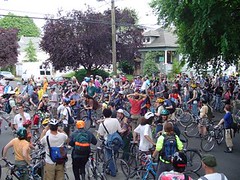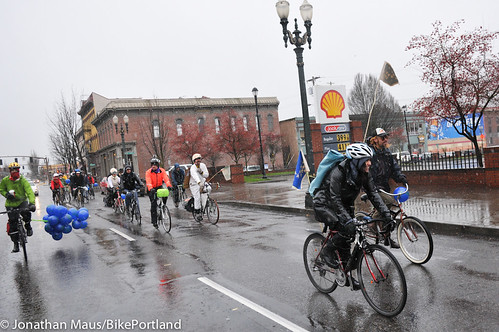
(Photos © J. Maus/BikePortland)
Today is the 20th anniversary of Critical Mass. In San Franciso, where the event was born back in 1992, a huge ride is planned to mark the occasion. The SF Chronicle says over 10,000 people might show up. Thousands are also expected to also ride in Chicago today.
But here in Portland, where we proudly hold the crown of the “best bike city in America” and where Critical Mass was once a prime focus for advocates and activists, there’s nothing planned. I haven’t heard a peep about it. No one is planning a ride.
Some say the often antagonistic and controversial monthly ride fizzled out because the need to demand respect for bicycling on Portland streets lost urgency as the City painted more bike lanes and improved bicycle access. The activists became advocates and then the advocates became bureaucrats who worked for change from the inside. Many people simply moved on from Critical Mass and devoted themselves to bicycle activism in other ways.
But that’s too tidy of an explanation. We also cannot forget that the Portland Police Bureau did just as much to do with the death of Critical Mass as changing attitudes. Back in 2005, in one of my earliest reports on the ride, I noted how the PPB was way too heavy-handed in the way they approached the event. There were even ugly clashes with riders as recently as 2006.
In 2006, the PPB spent over $20,000 and over 500 hours on Critical Mass enforcement.
The PPB ultimately helped kill the ride, not by force, but by not allowing corking. They made it clear that every single stop sign violation would be enforced. That made it impossible to ride as a group and it quickly turned people off.
Joe Biel, a local activist, publisher, and filmmaker has researched Critical Mass in Portland for years and is currently finishing up a documentary on the topic titled, Aftermass. He has already published a collection of police and court documents that give a window into what the police called the “Anarchist bicycle rally.” He turned them into Mad Libs.
Here’s what Biel says about the demise of Critical Mass in a blurb about his documentary: “From reading their internal files, the Portland Police department was highly wary of Critical Mass from day one and went as far as illegally spying on the group with their anti-communist “Red Squad” and forever cementing the meme that Critical Mass’ goals were rioting, blocking traffic, and antagonism with the public.”
“I think the story of Critical Mass is too often distracted by the controversies and individual’s conflicted opinions.”
— Joe Biel, filmmaker and publisher
Biel has devoted years of work to his documentary because he wants to tell the larger picture. “I think the story of Critical Mass is too often distracted by the controversies and individual’s conflicted opinions,” he shared with me this morning.
One major impact he believes Critical Mass had on Portland was that it, “served to retrain the Police Department’s perception and handling of cyclists and gave birth to the wide canvas of culture that we now celebrate everyday.”
And you might not realize it; but Critical Mass lives on in much more direct ways.
The PDX Bike Swarm that grew out of the Occupy protests, is in some ways Critical Mass 2.0 in Portland. “We’re taking the political aspect of Critical Mass to the next level,” said Nathan Jones at a recent Bike Swarm meeting. There are very important differences between Bike Swam and Critical Mass; but the relationship is unmistakable.
“Bike Swarm is about defending community control of the places we live in.”
— PDX Bike Swarm participant
One Swarm participant at a recent meeting I attended said, “I’m just not going to be satisfied until bikes are a majority. As long as we live in a world dominated by cars, riding a bike is political, whether your realize it or not.” Another person told me, “Bike Swarm is about defending community control of the places we live in.” Those comments sound a lot like the sentiments I remember hearing at Critical Mass back in the day.
But the similarities end there. The Bike Swarm is non-antagonistic, highly strategic (they’ve done organized actions around issues of financial reform, coal exports, hunger and housing, freeway expansion projects, and so on), they meet and hold rides and events regularly, and they have leaders — none of which could be said of Critical Mass.
In some ways, Swarmers have told me, Critical Mass is like when Occupy first started. A lot of people were mad and willing to hit the street to make demands. Now, that urgency and anger has changed. Occupy protests changed the dialogue and their issues have infiltrated the mainstream. Sound familiar?
I think for some, not having Critical Mass is a badge of honor. A sign that we have found a more effective formula for pushing bicycling issues. But for others, I think there’s a hole where Critical Mass used to be. There are grumblings in this community that we have gotten complacent and that our bike advocacy has become too connected with the power structure to agitate for the change we desperately need.
Having a seat at the table is great; but not if you’re afraid to insult the host.
Critical Mass itself has long been dead in this town; but its legacy and inspiration are very much alive. It has recently sprung back to life in Vancouver, Washington (just a few miles north of downtown Portland), do you think it will — or it should — ever return to Portland?



